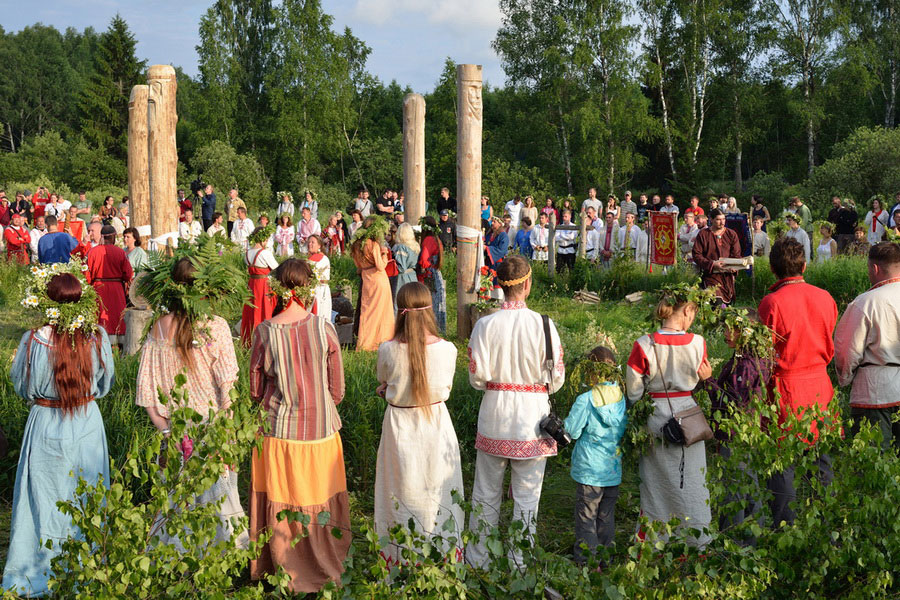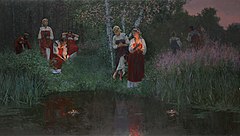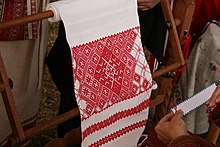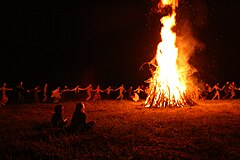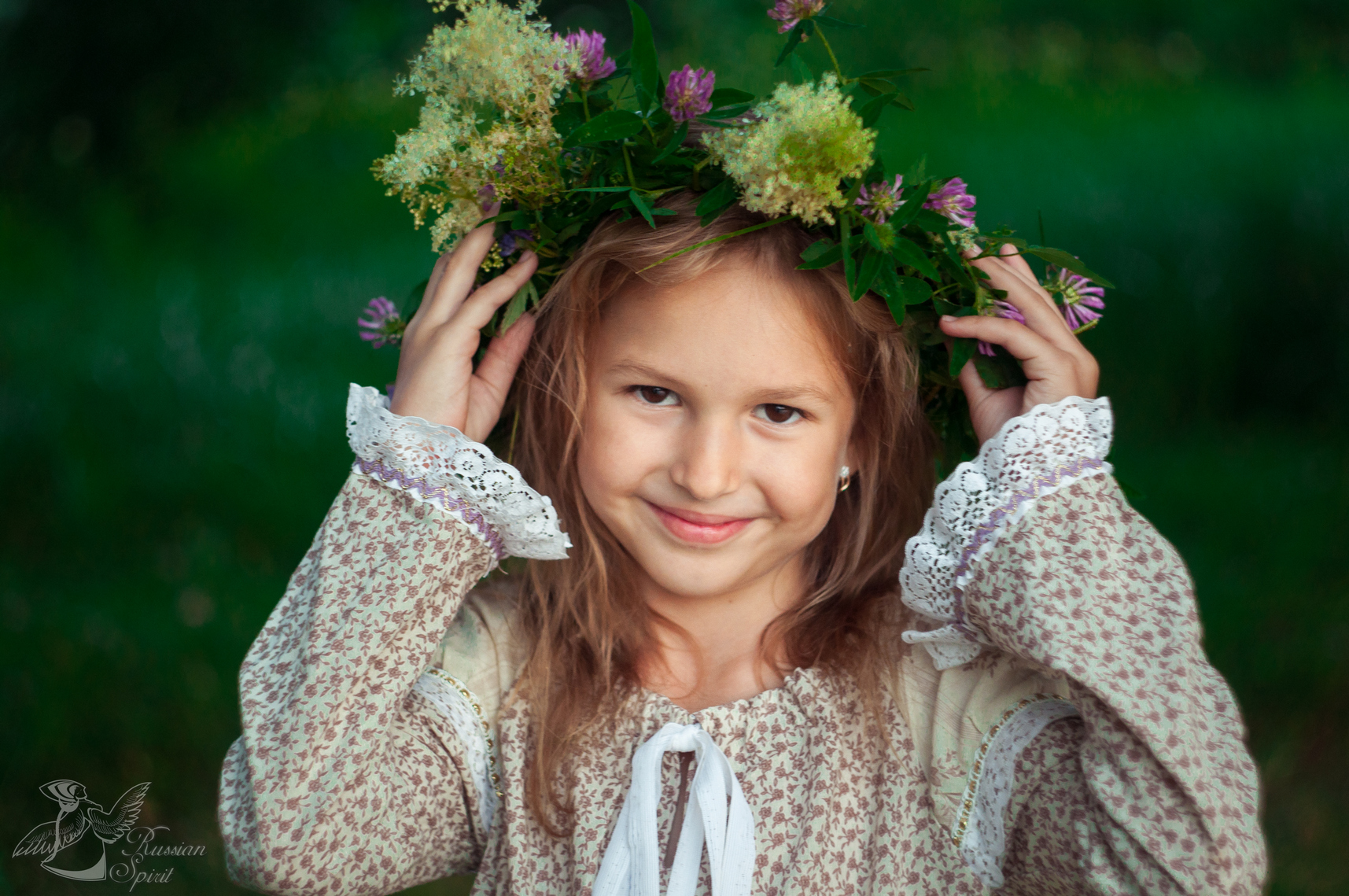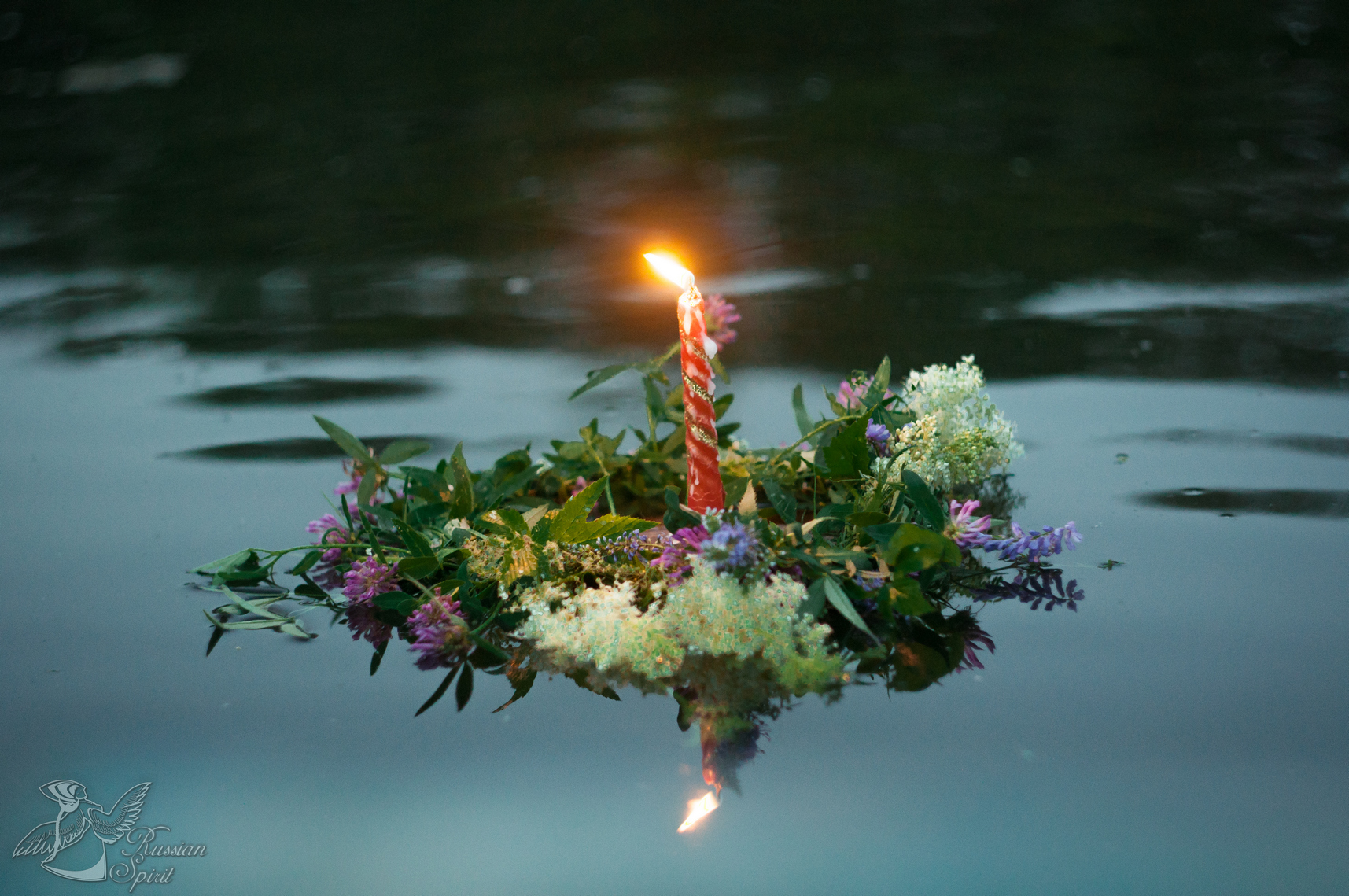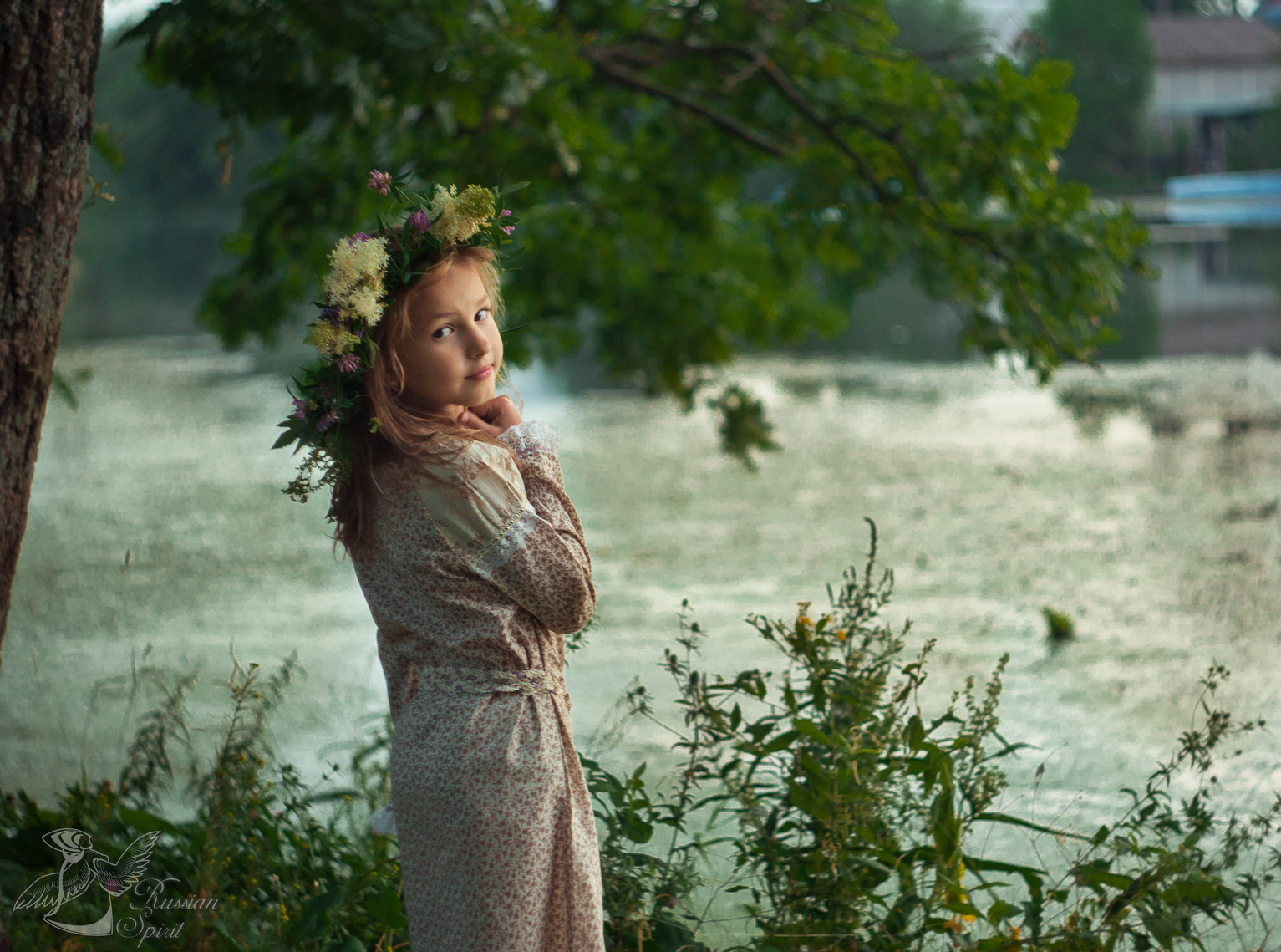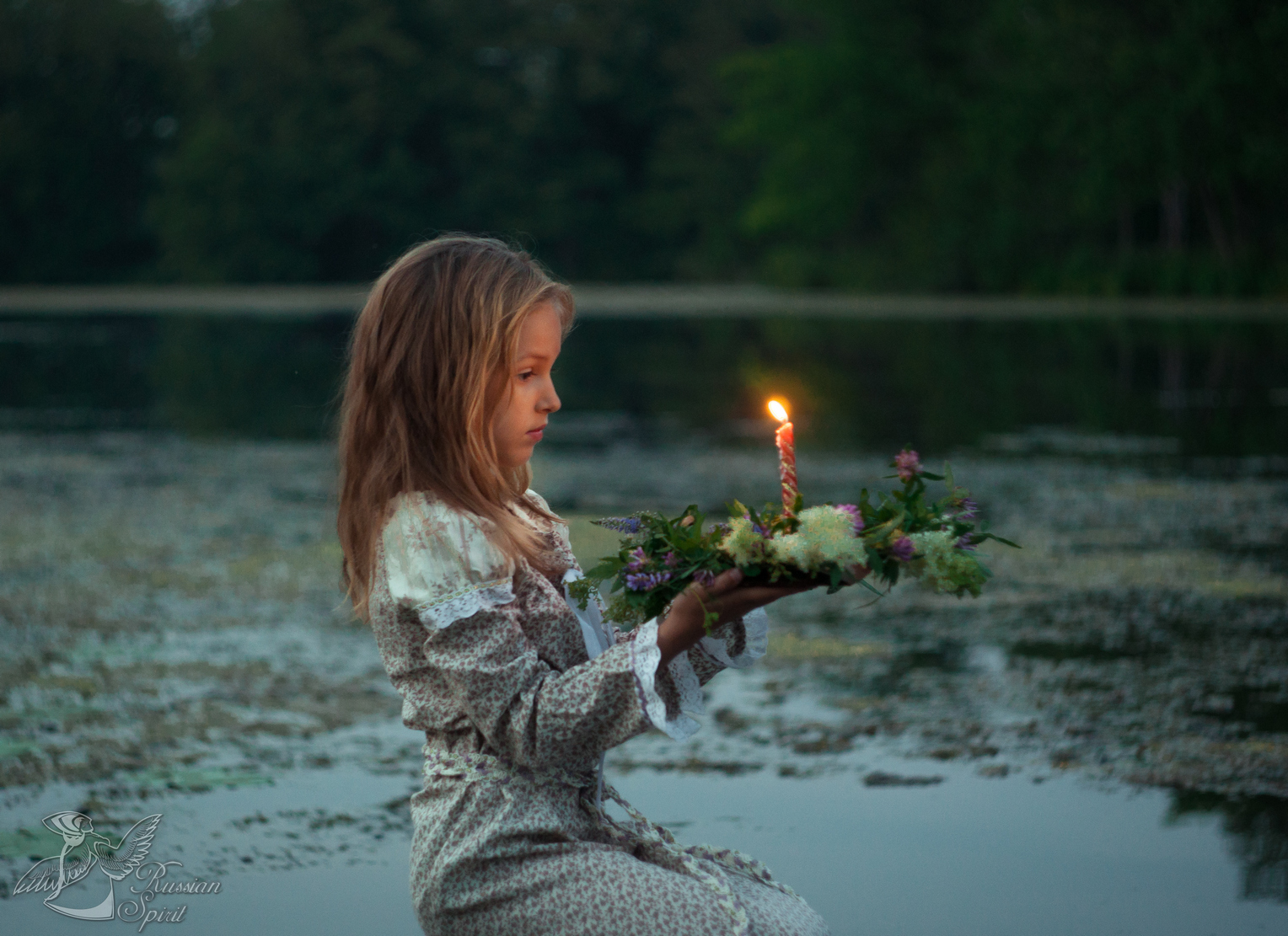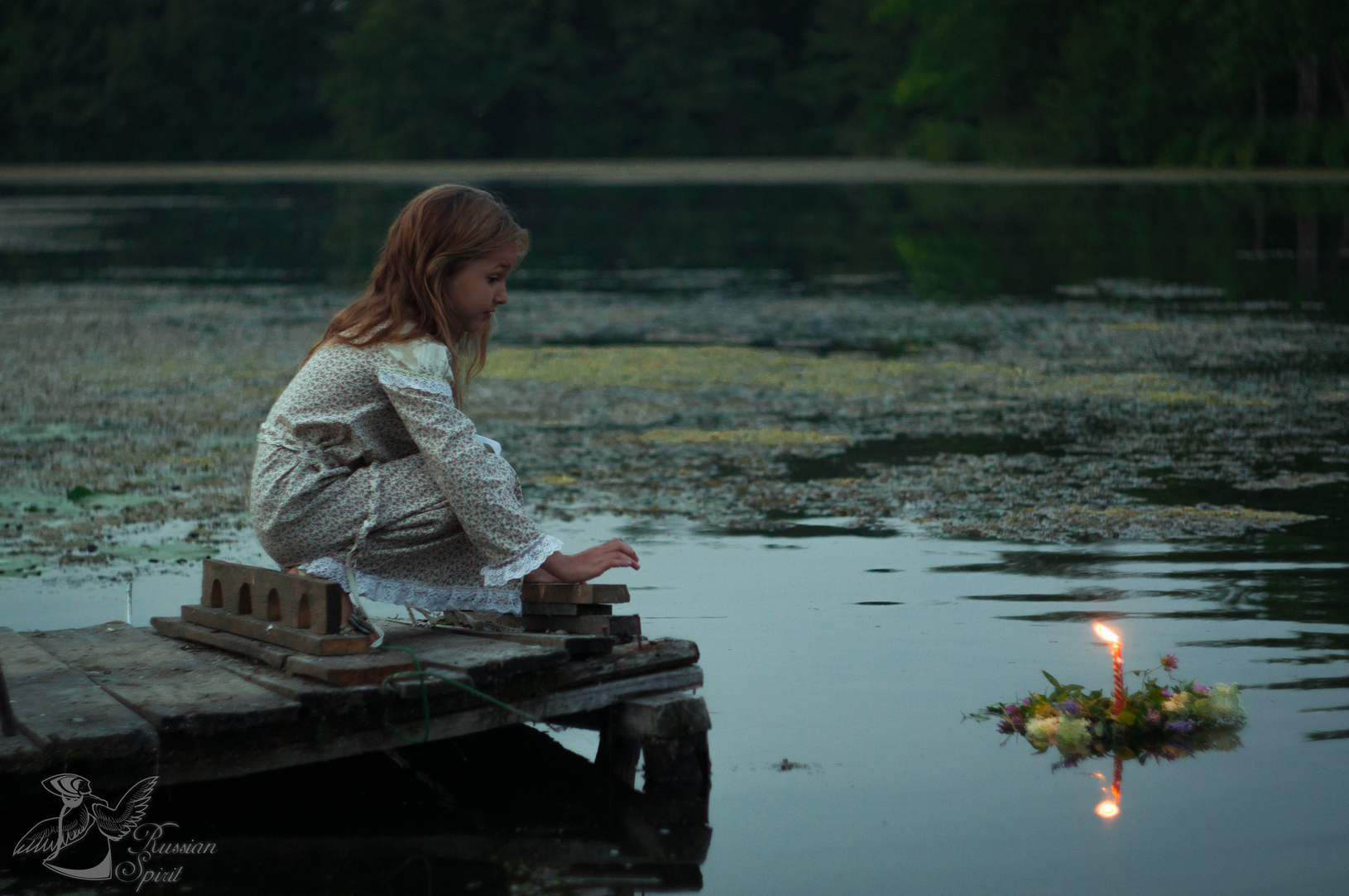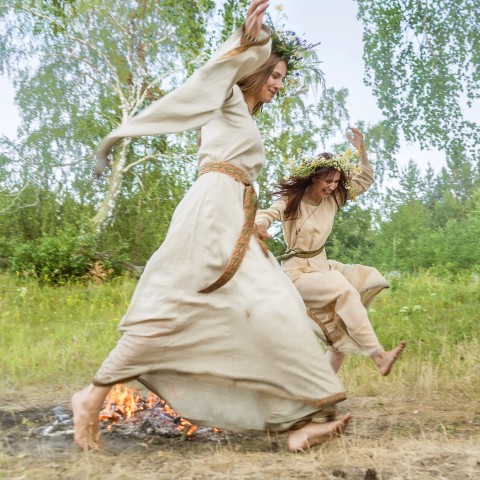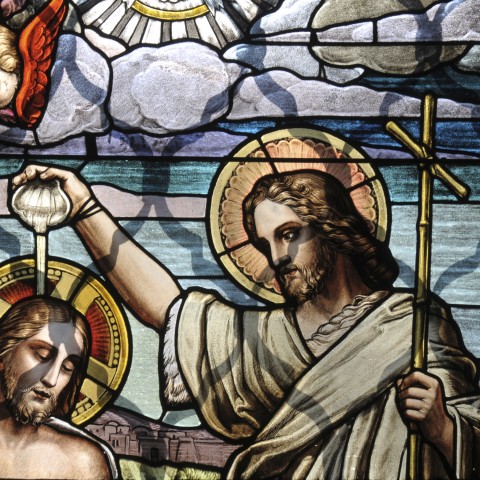- Home
- Russia
- Traditions
- Ivan Kupala
Since ancient times all peoples of the world have celebrated the end of June, the peak of the summer. Russia’s version of such a holiday is Ivan Kupala. On the night of 23 June, everyone celebrated this mystical but at the same time jolly holiday full of ritual acts, rules and prohibitions, songs, chants and all kinds of fortune-telling, legends, and beliefs.
Even in the time of the ancient pagan deity Ancient Russians used to have Kupalo, the God of summer fertility. In his honor people of sang songs and jumped over the bonfire. This ritual act has become an annual celebration of summer solstice, combining a pagan and Christian traditions. Kupala got the name Ivan after the baptizing of Russia, when he was replaced by John the Baptist (the way he was percepted by common people), who baptized Christ and whose birthday was celebrated on 24 June.
Ivan Kupala Rituals in Russia
On that day people wore girths of flowers and wreaths of herbs. They reeled, sang songs, stoked bonfires with poles topped by burning wheel, the symbol of the sun.
Songs that were sung in villages mentioned Kupala as loving, clean, and cheerful. On the day of Ivan Kupala girls made wreaths of herbs, and in the evening let them float on the water watching them go away. The sinking wreath meant the end of love and that there would be no wedding.
Another tradition was to pour dirty water on everyone in sight. It was believed that the more often people run to swim the purer their souls would become. The most healing swimming was considered at dawn.
The swimming night was lit with purifying bonfires to dance around and jump over. The highest jumper was the luckiest. Mothers used to burn the shirts of their sick children in those bonfires hoping to get rid of the awful In diseases. Young people participated in noisy games, brawls, running competitions. The most played was the game of race-and-catch.
People believed that all the miraculous and healing herbs bloomed during Ivan Kupala night. Therefore, knowledgeable and experienced people, and especially the village healers never missed that night and collected medicinal roots and herbs to keep for the whole year ahead.
There was a rumor that at midnight fern starts to bloom. Miraculous fiery flower could point to a buried treasure no matter how deep it had been hidden. Around midnight a bud appeared on the wide leaves. It rose higher and higher and then started to ”jump” around. As midnight came, the ripe bud burst and a fiery red flower came out. No man could pick up the flower. But if you saw it any wish would come true.
There was always something miraculous about the day of Ivan Kupala. No one slept at night, since it was believed that all evil became active: witches, werewolves, vampires, mermaids … People thought that Ivan Kupala was the day when witches had their holiday too, trying to cause as much harm to humans as they possibly could.
That was how the holiday of Ivan Kupala used to be — rituals, divination and other cheerful and lovely pranks…
From Wikipedia, the free encyclopedia
| Kupala Night | |
|---|---|

Night on the Eve of Ivan Kupala, |
|
| Also called | Feast of St. John the Baptist; Иван-Купала; Купалле; Іван Купала; Noc Kupały |
| Observed by | Slavic people |
| Significance | celebration relates to the summer solstice |
| Date |
|
| Related to | Summer Solstice, Nativity of St. John the Baptist |
Kupala Night (Belarusian: Купалле, Polish: Noc Kupały, Russian: Иван-Купала, Ukrainian: Івана Купала, Купайла), also called Ivanа Kupala, is a traditional Slavic holiday that was originally celebrated on the shortest night of the year, which is on 21-22[citation needed] or 23-24 of June (Czech Republic, Poland and Slovakia) and in Eastern Slavic countries according to traditional Julian calendar on the night between 6 to 7 July (Belarus, Russia and Ukraine). Calendar-wise, it is opposite to the winter holiday Koliada. The celebration relates to the summer solstice when nights are the shortest and includes a number of Slavic rituals.[1][2] It involves herb collecting, bonfire lighting, and bathing in the river.[3]
History[edit]
Simon Kozhin. Kupala Night, Divination on the Wreaths (2009).
The name of the holiday was originally Kupala; a pagan fertility rite later adapted into the Orthodox Christian calendar by connecting it with St. John’s Day which is celebrated on 24 June.[4] Eastern Christianity uses traditional Julian calendar which is misaligned with actual solstice; 24 June in Julian calendar falls on 7 July in more modern Gregorian calendar.[2]
This holiday symbolizes the birth of the summer sun – Kupalo. In the 4th century AD, this day was proclaimed the holiday of the birth of John the Baptist – the forerunner of Jesus Christ. As a result of the Christianization of the pagan feast the name «Kupala» got connected with the Christian «Ivan».[5]
The Ukrainian, Belarusian name of this holiday combines «Ivan» (Joan/Johan/John, in this case John the Baptist) and Kupala which was thought to be derived from the Slavic word for bathing, which is cognate. However, it likely stems from the proto-Slavic kump, a gathering. The two feasts could be connected by reinterpreting John’s baptizing people through full immersion in water. However, the tradition of Kupala predates Christianity. The pagan celebration was adapted and reestablished as one of the native Christian traditions intertwined with local folklore.[6]
Folklore and Slavic religious beliefs[edit]
Івана Купала (Ivanа-Kupala). Stamp of Ukraine (1998)
Many of the rites related to this holiday are connected with the role of water in fertility and ritual purification. This is due to the ancient Kupala rites.
On Kupala day, young people jump over the flames of bonfires in a ritual test of bravery and faith. The failure of a couple in love to complete the jump, while holding hands, is a sign of their destined separation.
Wreath thrown in water on Ivan Kupala Day Feast of St. John the Baptist
Girls may float wreaths of flowers (often lit with candles) on rivers, and attempt to gain foresight into their romantic relationship fortune from the flow patterns of the flowers on the river. Men may attempt to capture the wreaths, in the hope of capturing the interest of the woman who floated it.
Ceremonial making a fire. Kupala Night near Ślęża, Poland. June 18, 2022
There is an ancient Kupala belief that the eve of Ivan Kupala is the only time of the year when ferns bloom. Prosperity, luck, discernment, and power befall whoever finds a fern flower. Therefore, on that night, village folk roam through the forests in search of magical herbs, and especially, the elusive fern flower.
Traditionally, unmarried women, signified by the garlands in their hair, are the first to enter the forest. They are followed by young men. Therefore, the quest to find herbs and the fern flower may lead to the blooming of relationships between pairs within the forest.
Ferns are not angiosperms (flowering plants), and instead reproduce by spores; they cannot flower.
In Gogol’s story The Eve of Ivan Kupala (also called Saint John’s Eve), a young man finds the fantastical fern-flower, but is cursed by it. Gogol’s tale was adapted by Yuri Ilyenko into a film of the same name, and may have been the stimulus for Modest Mussorgsky to compose his tone poem Night on Bald Mountain.
See also[edit]
- Midsummer
- Wianki (Poland)
- Kupala
- Kupalinka (Kupala Night Maiden), popular Belarusian song
- Kupolė
- Jāņi
- Semik — a related spring holiday.
- Janka Kupała — the pen-name of this Belarusian author refers to his birthday of July 7.
- Loi Krathong — Thai autumn festival when people leave wreaths with candles on rivers
- Chaharshanbe Suri — Iranian festival celebrated on the eve of the last Wednesday of the year
References[edit]
- ^ website «Guide to Russia» [1] Archived 2017-01-09 at the Wayback Machine
- ^ a b Megre, Vladimir (2008). Rites of Love. Ringing Cedars Press LLC. p. 231. ISBN 9780980181289. Retrieved 2020-07-15.
- ^ Tryfanenkava, Maryna A. 2001. “The Current Status of Belarusian Calendar-Ritual Tradition”. In: FOLKLORICA — Journal of the Slavic, East European, and Eurasian Folklore Association 6 (2): 44-45. https://doi.org/10.7161/folklorica.v6i2.3709.
- ^ Niżegorodcew (et alii), Anna (2011). Developing Intercultural Competence through English: Focus on Ukrainian and Polish Cultures. Warsaw: Developing Intercultural Competence through English: Focus on Ukrainian and Polish Cultures Anna Niżegorodcew , Yakiv Bystrov , Marcin Kleban Wydawnictwo UJ. p. 91. ISBN 9788323384366.
- ^ «Ivan Kupala Day». authenticukraine.com.ua. Retrieved 2022-05-19.
- ^ «/culture_art/traditions». russia-ic.com/. Retrieved 31 October 2014.
External links[edit]
- Купалле
- Ukrainian Kupala (alt. Kupalo, Kupailo) traditions
- The Day of Ivan Kupala as it has survived in the Vologda Region
- Kupalle holiday in Belarus (video) Archived 2020-09-27 at the Wayback Machine on the Official Website of the Republic of Belarus Archived 2020-04-02 at the Wayback Machine
- Kupala Night in Poland
Today Russian church celebrates one more interesting holiday that originates in paganisme – Ivan Kupala holiday.
In the old time the Slavs attributed this holiday to summer solstice 20-21 of June by old calendar. As soon as the christianity was accepted, the people didn’t reject and forget this holiday and the church attributed it to the Day of John the Baptist, which falls on the 24 of June by old calendar or 7th of July by new calendar.
The holiday of Kupala (i.e. bathing holiday) was very respected by east Slavs and its pagan character is conserved through many centuries.
It was time of the highest flowering of nature: the sun in zenith, the plants in full flowering, the fruit start ripening. Thus the magical force of fire, water, earth and plants was so big, that they had medicinal and protective properties. The participation in the rituals ensured good fortune for the whole year.
At night people used to make many rituals, games and fortune-tellings. So the most important forces in the night of Ivan Kupala were water, fire and plants. People gathered medicinal herbs and made wreaths, burnt big fires, jumped over them in order to drive the sickness away, burnt out the old clothes in order to be cleansed, bathed in rivers and lakes or went to banya if there was no river by side.
In the morning the Slavs used to wash with dew that also had its magical properties to heal.
One of the most popular rituals was the fortune-telling by means of a wreath made from medicinal herbs. They put a candle into a wreath and launched in water. Everyone attentively looked at his wreath:
- If it goes too fast, it means happy life
- If the candle doesn’t die out, it means very long life
- If the wreath sank, the young woman won’t get married this year
The main flower that nignt was a fern flower. By legend if to find this bright and rare flower which appears only at Kupala night and blossoms only during some hours, it will bring much happiness and indicate the way to find a treasure.
This great holiday full of magic, mystics and revealing strong and wise character of our ancestors, is not forgotten nowadays and is celebrated in many Slav countries. In Russia we organize games, festivals and bathing in rivers and lakes especially for children. Of course it is not apprehended so seriously as before but more just to have fun and conserve the traditions.
One of the most ancient and important Slavic holidays in Russia is the holiday of Ivan Kupala, celebrated since the twelfth century. Essentially, this day is held in commemoration of St. John the Baptist, though Russians also celebrate through more pagan events.
In learning about the Ivan Kupala Day holiday in Russia, you’re opening yourself up to some unique facets of Russian culture. And as any successful language-learner can tell you, knowing a country’s culture is vital in mastering its language.
At RussianPod101.com, we hope to make this learning journey both fun and informative! So let’s get started and delve into Ivan Kupala Night, and the following Ivan Kupala Day, in Russia!
1. What is Ivan Kupala’s Day?
In ancient times, people observed the holiday of Ivan Kupala on the day of the summer solstice (June 20-22). Once Russia adopted Christianity, people linked the celebration to John the Baptist’s birthday on June 24 (old style) or July 7 (new style).
Nobody really knows where the holiday got its name. Some connect it to the Pagan god Kupala, while others say it comes from the Slavic version of St. John the Baptist’s name.
2. When is Ivan Kupala Day?
Each year, Ivan Kupala’s Day is celebrated on July 7 in Russia, beginning on the evening of July 6.
3. Reading Practice: How is Ivan Kupala Day Celebrated?
How do the Russians celebrate Kupala Night and Ivan Kupala Day? Read the Russian text below to learn about Ivan Kupala festival traditions, old and current. You can find the English translation directly below it.
—
Русский народ ассоциирует три главных символа с Днем Ивана Купалы- – огонь, вода и трава. Таким образом, многие традиции и верования относительно этого праздника имеют отношение к этим трем вещам.
Одной из таких традиций является традиция костра. Русский народ будет строить большой костер и прыгать через него, так как это, как полагают, лечебные силы в эту ночь. Кроме того, в старые времена люди сжигали одежду больных людей в надежде, что они выздоровеют быстрее. Для того, чтобы это сработало, люди думали, что огонь должен быть сделан путем потирания вместе сухих палочек.
В День Ивана Купалы девицы плели венки из цветов с поля и отпускали их вечером, чтобы поплавать на озере или поверхности реки. Затем они наблюдали венок. Если венок застрял вдоль берега, его владелец не женится в этом году; если он скорее затонул, это считалось плохим предзнаменованием. Чем дальше венок плыл с берега, и чем дольше он фактически оставался на плаву, тем счастливее судьба девицы в конечном итоге.
Еще одно интересное убеждение, связанное с этим праздником в древние времена? Люди верили, что накануне Ивана Купалы оживают деревья и растения, разговариваются друг с другом и даже перемещаются по лесу.
—
The Russian people associate three main symbols with Ivan Kupala Day: fire, water, and grass. Thus, many traditions and beliefs regarding this holiday have to do with these three things.
One such tradition is that of the bonfire. The Russian people will build a large bonfire and jump over it, as this is thought to have curative powers on this night. Further, in the old times, people burned the clothing of sick people in hopes that they would recover faster. In order for this to work, people thought that the fire must be made by rubbing together dry sticks.
On Ivan Kupala Day, maidens wove wreaths made of flowers from a field, and let them go in the evening to float on a lake or river’s surface. They then observed the wreath. If the wreath got stuck along the shore, its owner would not get married that year; if it rather sunk, this was considered a bad omen. The further the wreath floated from the shore, and the longer it actually stayed afloat, the happier the maiden girl’s fate would end up being.
Another interesting belief associated with this holiday in ancient times? People believed that on the eve of Ivan Kupala, trees and plants came to life, talked with each other, and even moved around the forest.
4. The Symbolic Plant of Ivan Kupala’s Day
Do you know which plant is the symbol of Ivan Kupala Day?
Since ancient times, the symbol of Ivan Kupala Day is the fern. There’s a legend associated with fern flower, which blooms only one time during the year: Ivan Kupala Night. Whoever finds this fern flower will be gifted with many useful and interesting abilities:
- Understanding bird and animal language
- Seeing into the future
- Becoming invisible
- Finding buried treasure easily
Who wouldn’t want at least one of these abilities?!
5. Vocabulary You Should Know for Ivan Kupala Day
Here’s some vocabulary you should know for Ivan Kupala’s Day in Russia!
- Вода (voda) — “water”
- Июль (iyul‘) — “July”
- Плавание (plavaniye) — “swimming”
- Растение (rasteniye) — “plant”
- Огонь (agon`) — “fire”
- Папоротник (paporotnik) — “fern”
- День Ивана Купалы (Den’ Ivana Kupaly) — “Ivan Kupala’s Day”
- Гадание (gadaniye) — “divination”
- плетение венков (pleteniye venkof) — “weave wreaths“
- командная игра (kamandnaya igra) — “team game”
- прыгать через костёр (prygat’ cheres kastyor) — “jump over the bonfire”
- 7 июля (7 iyulya) — “July 7th”
- Иоан Креститель (Ioan Krestitel’) — “John the Baptist”
- Костер (kastyor) — “bonfire”
To hear each vocabulary word pronounced, check out our Ivan Kupala’s Day vocabulary list.
Conclusion
What do you think of the Kupala Night Russia observes each year? Which of the beliefs associated with it do you find most interesting? Let us know in the comments!
To continue learning about Russian culture and the language, keep exploring RussianPod101.com! We provide fun and practical learning tools for every learner, including free Russian vocabulary lists and more insightful blog posts like this one! We also have an online forum where you can talk with fellow Russian learners or reach out for help!
To take even more control over your Russian learning, upgrade to Premium Plus! With a Premium Plus account, you can take advantage of our MyTeacher program, and learn Russian one-on-one with your own teacher!
Know that your hard work will pay off, and you’ll be speaking, reading, and writing Russian like a native before you know it! And RussianPod101.com will be here with you on each step of your journey to language mastery.
Ivan Kupala Day
Created by the student of the 9 th V class: Savkina Ekaterina
Ivan Kupala Day used to be celebrated all over Russia in old times. It takes place usually on 7th July. It is held to celebrate the holiday of St John the Baptist and it is still popular today with young Russians in some provinces.
Everything about the celebration relates to water. On the evening before called Tvorila night children have playful water fights and throw buckets of water all over each other
Some people consider Ivan Kupala day to be the first day of the swimming season and if the water is warm hope that it will bring them happy marriages , boys and girls happily in rivers and lakes until late at night . Girls like to float candies and delicate flowers in the.
In the past, young people used to burn fires and jump joyfully over them holding hands.
There is also a belief that on the eve of Ivan Kupala magical fern flowers can be found in the forests. In some villages, people look forward to Ivan Kupala Day enthusiastically. It is ancient celebration which continues to be fun for all family members whatever their ages.
Thanks for watching!!!
- Главная
- Топики
- Праздники и традиции
Kupalle celebrate on June 21. It is a traditional and the most loved holiday in Belarus.
Kupalle is a pagan summer celebration of fertility in the name of a female God — Kupala. Lately it was renamed into a Christian celebration of male saint-Ivan Kupala.
Kupalle usually involves youth going into a forests and the meadows, wearing flowers and grass garlands, dancing in karagods (circles around fires), jumping through fires.
A popular kind of Kupalle was fortune-telling – putting wreaths on water. People believed that on Kupalle night the fern has a very special flower-«paparats-kvetka»- glowing in the dark. If you find the flower, you’ll be happy. But no one has found «paparats-kvetka» yet.
Версия для печати
Другие топики по теме:
- Holidays in Great Britain
- Halloween
- Father’s Day
- Customs and traditions of english speaking countries
- Thanksgiving Day (2)
- Fireplaces
- Cultures and national stereotypes
- Public holidays
- July 4 th — Independence Day
- USA Holidays
- Весь список

